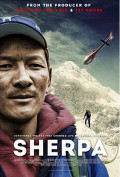
Directed by
Jennifer Peedom
96 minutes
Rated PG
Reviewed by
Bernard Hemingway

Sherpa
Synopsis: A documentary exploring the role of the Sherpa mountain guides and porters as they struggle for better pay and conditions in the aftermath of a disastrous 2014 avalanche. .“Money makes the world go around” sang Joel Grey in Cabaret,and that acerbically cynical point of view is well justified by Australian writer-director Jennifer Peedom’s account of the relationship between the Western expedition companies and the Sherpa people they employ to get their clients safely up and down the world’s most famous mountain.
A valuable companion piece to last year’s adventure-drama, Everest, this documentary tells the untold story of the people who since Edmund Hillary’s iconic 1953 climb to the top of the world have been obligingly and invisibly making possible Westerner’s ascent of Chomolungma as the Sherpas call the mountain we know as Everest.
Initially conceived as an exploration of the deteriorating relationship between Sherpas and foreign climbers after a well-publicised 2013 punch-up between the increasingly hostile co-dependents, matters took a more grievous turn during filming after an avalanche killed 13 Sherpas, the worst loss to date of human life on Mt Everest in a single day.
Despite its tragic aspect, as a documentary-maker Peedom got lucky as the incident brings sharply into focus the difference between two world views. Remarkably, while the Sherpas want to call the climb off, partly for fear of their lives, partly to mourn their dead, the Western expedition leaders and their clients want to continue with the climb. It’s a staggering response that makes evident the fundamental clash of values at stake.
Manifesting in the small scale the same kind of dim-witted mentality that has seen the destruction of innumerable indigenous societies from the Incas to the Australian Aboriginies at Western hands, many of the climbers are not only oblivious to the Sherpas' spiritual, religious and cultural relationship to their homeland in general and Chomolungma in particular, but are also acutely aware of the financial cost to them if the expedition does not go ahead.
Sensitively articulating the issues at stake Peedom focuses on one Sherpa, Sirdar Phurba Tashi, and his family, and, on the Western side,New Zealander, Russell Brice, the leader of one of the many expedition companies attempting to scale Everest. Through the former we get a modest insight into the Sherpas’ way of life, and the importance of the Western companies to the local economy (the Nepalese government also takes a hefty “no-obligation” licence fee, resulting in a ridiculous proliferation of would-be adventurers).
The main issue, one which comes to a head because of the tragedy, is that the Sherpas, despite taking a lion’s share of the risk and doing most of the heavy lifting, are poorly paid, have no insurance, and no benefits scheme. In a word they are exploited for the benefit of well-to-do Westerners. Indeed as the post-avalanche stand-off escalates, and the Sherpas effectively go on strike, one can’t help but think of the response of American Southerners to the abolition of slavery and thereby the threat to their life of privilege. Even Brice, who for the most part comes across as a decent fellow aware of the moral issues at stake, is nevertheless acutely aware of his business interests and ultimately goes into denial, feeblyclaiming that the strike is driven by a handful of hardline rebels (one of his peeved clients compares them to Al Queda terrorists, another asks why their “owners” can’t remove them)
Combining armchair adventuring with thoughtful reflection on the human condition, Sherpa presents its story with grace and intelligence, allowing us to make our own inferences and achieving a good deal of poignancy in the process.

Want more about this film?


Want something different?




